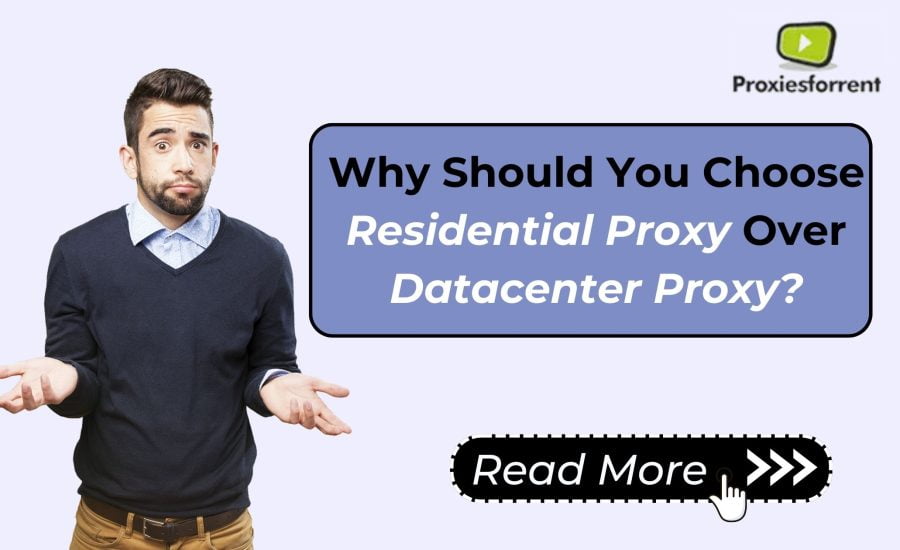In today’s digital age, the importance of proxies cannot be overstated, especially when it comes to safeguarding online privacy and carrying out competitive market research. This comprehensive guide will delve into the distinctions between residential proxies and datacenter proxies, helping you make an informed decision for your business needs.
What Proxies Should You Use for Your Business?
When considering proxies for market research, the choice often boils down to residential proxies and data center proxies. Residential proxies offer unlimited bandwidth, making them the best residential proxies for tasks that require a high level of authenticity. On the other hand, data center proxies are known for their speed and efficiency.
What is a Datacenter Proxy?
A datacenter proxy is a type of proxy that is provided by a secondary corporation and does not use an ISP. These proxies are known for their high speed and are ideal when quick response times are crucial. People often buy data center proxies for tasks that require a higher level of efficiency and where the user’s geographical location is not a primary concern.
Types of Data Center Proxy
Datacenter proxies, vital for online security and tasks, vary in type. Each offers unique benefits in speed, privacy, and access, suiting different business and individual needs.
1. Shared Data Center Proxies
Shared datacenter proxies are used by multiple users simultaneously. These are the most cost-effective options and are ideal for users with a limited budget. The downside is a higher risk of being blacklisted, as the actions of other users on the same proxy can affect you.
2. Dedicated Data Center Proxies
Dedicated datacenter proxies offer exclusive use of an IP address to a single user. These are more secure and reliable than shared proxies. They are ideal for sensitive tasks where privacy and a low risk of being blacklisted are crucial.
3. Rotating Data Center Proxies
Rotating datacenter proxies automatically change the user’s IP address at regular intervals or per request. This type of proxy is beneficial for tasks like web scraping, as it reduces the chances of being detected and banned by target websites.

4. Static Data Center Proxies
Static datacenter proxies provide a fixed IP address for a prolonged period. They combine the reliability of a dedicated proxy with the stability of a constant IP, making them suitable for tasks that require a consistent identity, like managing online accounts.
5. Private Data Center Proxies
Private datacenter proxies offer a unique IP address that is not shared with other users. These proxies provide a high level of anonymity and security, making them ideal for businesses and individuals who handle sensitive data.
6. HTTP/S and SOCKS Proxies
Data center proxies can also be classified based on the protocols they support:
Primarily used for web browsing and handling web-based traffic.
- HTTP/S Proxies
More versatile and can handle any type of traffic, not limited to web-based protocols.
Benefits of Data Center Proxies
- Speed
They are faster than residential proxies because they come from powerful servers.
- Cost-Effective
Generally cheaper than residential proxies.
- Anonymity
Offer a degree of anonymity, though not as high as residential proxies.
Limitations
- Risk of Detection
More prone to being blocked by websites compared to residential proxies.
- Limited Geographical Diversity
They lack the extensive geographical coverage that residential proxies provide.
Choosing the Right Type
The choice of a data center proxy depends on your specific needs:
1. For budget-conscious users, shared proxies might be suitable.
2. Dedicated or private proxies are better for sensitive, high-security tasks.
3. Rotating proxies is ideal for data scraping and avoiding detection.
What is a Residential Proxy?
Residential proxies are proxies that are linked to a real ISP, providing you with an IP address that appears as a regular home user. This feature makes residential proxies ideal for tasks that require a high level of authenticity, such as market research or managing social media accounts.
Types of Residential Proxy
Residential proxies, provided by ISPs, offer authentic, real-user IP addresses for diverse online activities, enabling users to choose types best suited to their specific needs.
1. Rotating Residential Proxies
Rotating residential proxies automatically assigns a new IP address to each connection request or after a set period. This feature makes them ideal for tasks that require a high level of anonymity, like web scraping, as it significantly reduces the risk of being detected and blocked.
2. Static Residential Proxies
Static residential proxies provide a single IP address that stays the same for an extended period. They combine the legitimacy of a real residential IP with the stability of a static IP. These proxies are perfect for online activities that require a consistent identity, such as social media management or online marketing campaigns.
3. Dedicated Residential Proxies
Dedicated residential proxies offer exclusive access to an IP address that isn’t shared with other users. These proxies provide a high level of security and are less likely to be blacklisted, making them suitable for sensitive operations where privacy is a priority.
4. Shared Residential Proxies
Multiple users use shared residential proxies at the same time. They are more affordable than dedicated proxies but come with the risk of other users’ activities affecting your own, such as getting the IP address blacklisted.
5. ISP Proxies
ISP proxies are a hybrid between data center and residential proxies. They are issued by internet service providers but hosted on data center servers. This type provides the speed of a data center proxy with the authenticity of a residential proxy.
6. SOCKS5 Residential Proxies
SOCKS5 residential proxies support more types of traffic than HTTP/S proxies and offer better performance with non-web-based applications. They are particularly useful for activities that require handling different types of protocols or transferring large amounts of data.

Benefits of Residential Proxies
- High Anonymity
Mimic real-user behavior, making them less likely to be detected and blocked.
- Wide Geographical Coverage
- Offer IP addresses from various locations around the world.
- Legitimacy
Ideal for tasks that require a high level of authenticity.
Limitations
- Cost
Data center proxies are generally more expensive.
- Speed Variability
Speed can vary since they rely on real residential connections.
Choosing the Right Type
1. Rotating proxies is best for scraping and tasks requiring high anonymity.
2. Static proxies are ideal for operations needing a consistent online presence.
3. Dedicated proxies offer exclusivity and security for sensitive tasks.
Differences Between Residential and Datacenter Proxies
Distinguishing residential from data center proxies is key for effective digital strategies in web scraping, marketing, and more, as each offers distinct features, benefits, and constraints for varied online needs.
1. Source and Legitimacy
- Residential Proxies
Issued by Internet Service Providers (ISPs) and tied to a physical location. They represent a real user’s IP address, providing high legitimacy and lower chances of being detected and blocked by websites.
- Datacenter Proxies
Provided by data centers, not associated with ISPs. They don’t correspond to an ISP-tied physical address, making them less legitimate in the eyes of some online services.
2. Speed and Performance
- Residential Proxies
The speed can vary as they rely on real residential internet connections. While they are generally stable, they might not always match the high speeds data center proxies provide.
- Datacenter Proxies
Known for their high speed and performance, as they are hosted on powerful servers. This makes them suitable for tasks requiring quick response times.
3. Use Cases
- Residential Proxies
Ideal for tasks requiring high levels of authenticity, such as social media management, ad verification, and market research. Their real-user appearance makes them less likely to be flagged.
- Datacenter Proxies
Best for tasks where high speed is crucial, like large-scale web scraping (where legitimacy is less of a concern) and managing high-traffic websites.
4. Geographical Diversity
- Residential Proxies
Provide IP addresses from a wide range of geographical locations, making them suitable for bypassing geo-restrictions and localized testing.
- Datacenter Proxies
Limited geographical diversity compared to residential proxies. Their IP addresses are often concentrated in certain regions where data centers are located.
Conclusion
In conclusion, the choice between a residential proxy and a data center proxy depends on your specific requirements. If authenticity and low block rates are crucial, go for a residential proxy. However, if speed and cost are more significant, a data center proxy might be the better choice.
Frequently Asked Questions
Q1. How do datacenter proxies differ in functionality from residential proxies?
Datacenter proxies are faster and more suitable for tasks requiring high speed and less emphasis on geographical diversity and legitimacy.
Q2. Can I use residential proxies for ad verification?
Yes, residential proxies are ideal for ad verification tasks as they can simulate real-user behavior from various locations.
Q3. Which proxy type is better for managing social media accounts?
Residential proxies are preferred for social media management due to their real-user appearance and lower risk of account suspension.



